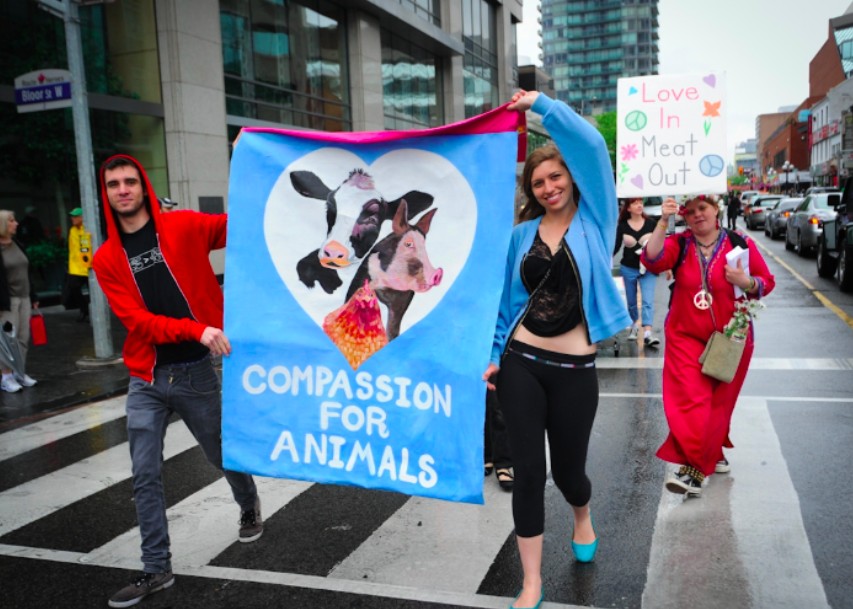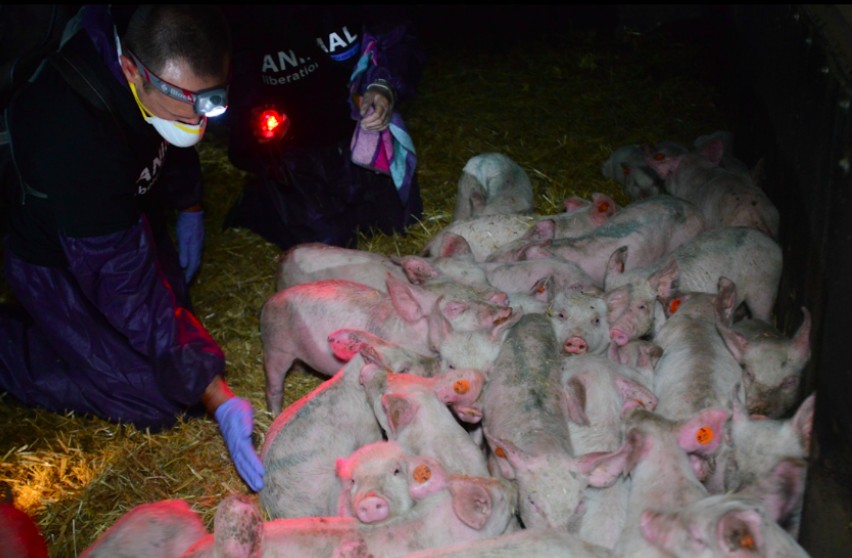Fact Check
How Easy Is It to Get a Humane Label for Meat? Very
Meat Lobby•5 min read
The benefits of a vegan lifestyle are many and differ from person to person. However, many vegans just feel better overall. Whether that has to do with being healthier, happier, guilt-free, or a combination of those or other factors depends on the person.


Words by Sentient Media
The vegan health benefits that one achieves by cutting out all animal products are but a bonus to the clean conscience one finds knowing they aren’t contributing to the needless slaughter of countless lives.
Many people make the switch because of their desire to speak up for those who can’t. It’s a desire to protect non-human animals and their right to a cruelty-free life.
So when people make the transition, they find there are many health benefits to veganism as well.

Many people outside of the movement believe that becoming vegan simply means cutting out animal products for food choices.
And while that is partially correct, it doesn’t cover everything. Veganism and the vegan lifestyle go well beyond the plate and what we choose to call food.
Going vegan means that one cuts out all animal products including, but not limited to, leather, suede, wool, and silk while also avoiding the use of products that are tested on animals in the production stages.
Veganism is on the rise in many places around the world and it’s only the beginning.
With companies like Beyond Meat announcing the world’s first plant-based IPO and major support from backers like Bill Gates and even Tyson Foods, we are starting to see a major shift in the acceptance of veganism and the drive of the movement from the fringes of society into the mainstream.
This growing acceptance will eventually lead to more and more people getting on board, whether that means becoming vegan or embracing of clean meat, only time will tell.
Jacy Reese, the author of The End of Animal Farming touched on this idea perfectly in an interview with Vox. In regards to veganism becoming more and more mainstream, Reese said that “once they have more and more friends who are eating plant-based foods, once there’s more availability in their local restaurants and local retailers or the community, once you have a better and better product — whether that’s the Impossible Burger 5.0 or whether that’s a cultured hamburger — that’s going to make it far easier.”
The noise that the rise in veganism is making right now will help drive awareness of the vegan lifestyle in two extremely important ways. First, by helping expose the horrors of factory farming to the masses. And second, by showing that there are many vegan health benefits.
Absolutely. But before talking about the many vegan health benefits one receives from a plant-based diet, it would be a disservice by not first mentioning why meat is so bad for you.
Big food wants you to think otherwise, though. Whether it’s the egg or dairy industry or the meat industry, people have been conditioned to believe that without animal products, humans will wither away to an emaciated, weak state of being. Hyperbole much? Perhaps a little. But the message is real.
Big food wants you to believe that eating animal products is key to a healthy diet.
This simply isn’t true. Not in the least.
According to a study about the health risks associated with the consumption of meat, it was found that “the long-term consumption of increasing amounts of red meat and particularly of processed meat is associated with an increased risk of total mortality, cardiovascular disease, colorectal cancer, and type 2 diabetes, in both men and women.”
The China Study by T. Colin Campbell and his son Thomas M. Campell II is the most comprehensive look at the negative impact meat and dairy have on the human body and health. The study spanned two decades across dozens of counties across rural China. The study tracked the behavior of the same people across twenty years to see how their diets impacted their health, and more importantly, how the consumption of meat and dairy were detrimental to the well-being of the subjects.
The results were clear. Those who avoided animal products in their diet lived much healthier lives than those who consumed meat and dairy products.
So what are the main vegan health benefits? We’ll get to that in a moment.
To vegans and vegetarians, the answer to this question is quite obvious.
But to people who eat meat and don’t pay attention to the movement, there is still a lot of confusion.
Vegetarianism is a great step in the fight for animal rights and the quest to a healthier lifestyle. However, it doesn’t have the same positive impact that veganism has. And the vegan health benefits that we will discuss below far outweigh the benefits seen by vegetarians as cutting dairy and eggs from your diet can help in a lot of different ways.
Veganism differs from vegetarianism in that vegans avoid all animal products while vegetarians avoid eating dead animals. That is the simplest way to put it.
A vegetarian, for instance, might still wear leather shoes and eat eggs while a vegan would never dream of doing either.
Vegetarianism is usually the gateway to veganism and an important step for those considering going vegan.
There are many vegan health benefits that should be taken into consideration by those looking to improve their overall wellbeing.
First off, being vegan alone isn’t going to make you a healthy person. You will be healthier than when you ate meat, but simply cutting out animal products isn’t going to help you on its own. Eating loads of fries and veggies burgers for every meal isn’t going to benefit your health.
Many younger vegetarians transitioning for the sake of animals are guilty of this behavior. However, they typically embrace the health benefits later in life. This happens as they become more aware of how eating a balanced diet is a vital component of living well.
So what are some vegan health benefits one will achieve by going plant-based?
Let’s be very clear from the start. You can still get food poisoning from plants. A plant-based diet does not make you free from the risk of food poisoning.
Anyone in North America right now will know that because of the E. coli scare and recall of Romaine lettuce in November of 2018.
Food poisoning can happen from many of the staples of a vegan diet including fruits, vegetables, sprouts, and rice.
In fact, vegetables were the number one culprit responsible for food poisoning in the US between 1998 and 2012.
But let’s dig in a little to understand the reason for that.
Big food dominates the shelves at your grocery store and makes it so there is a huge chance of being responsible for the production of the food that you end up eating. That includes your vegetables.
Large farms (that generate over $1M in annual sales) account for less than 5% of the farms in the US but close to 70% of all sales.
Because of this, it’s very likely that farms that grow both produce and raise animals will have cross-contamination issues. Beyond what’s happening at the farms, manufacturing facilities spread illnesses as well.
So while vegetables have the highest number represented in the chart above, the main issue is the way our food system is built for maximum profit and efficiency.
Even so, however, if you add up all of the different rows in that chart, you will see that there is still a smaller chance of getting food poisoning with a vegan diet.
According to the U.S. Food and Drug Administration, eating local is a great way to combat food-borne illnesses.
Smaller farms, especially organic farms, are much more careful with the handling of the food they produce to ensure that contaminations are controlled and avoided at all costs.
Because of the food system that is in place, especially in large markets like the US, the chances of food being contaminated during transit and packaging are much higher than on smaller farms that sell their food to local communities at farmers markets.
The Western diet is not famous for being healthy or balanced.
A lot of the food is packed with refined sugars, saturated fats, and fatty oils. These ingredients make it necessary to eat a lot to “feel full.” The problem is we are eating far too much and not getting the nutrients our bodies need. Because of that, we see expanding waistlines and high cholesterol levels.
Another problem with the Western diet is that people eat large meals consisting of one type of food. A plate of pasta is the perfect example. By consuming a plate of pasta, you aren’t getting the nutrients your body needs to function at its best.
With the vegan diet, people tend to cook more at home because there aren’t as many options when eating out. This is especially true if you’re a vegan outside of major cities that have countless options.
When you are cooking your own food, there is a good chance you are more experimental and more creative in the kitchen. Vegans tend to add many different ingredients to their plates in order to feel full and satisfied after a meal. And because the ingredients are typically vegetables, grains, legumes, and other whole foods, the portions don’t need to be nearly as big as the mega portions you tend to see in restaurants.
So not only are you eating smaller portions, you are getting the nutrients your body actually needs.
The consumption of meat has been linked to heart disease and atherogenesis in countless studies.
In fact, “atherosclerosis associated with high dietary intake of meat, fat, and carbohydrates remains the leading cause of mortality in the US” according to the study A Plant-Based Diet, Atherogenesis, and Coronary Artery Disease Prevention.
A diet combining a high intake of cholesterol and saturated fats has made heart disease the leading killer in the United States, taking upwards of 200,000 lives each and every year.
The worst part about these deaths?
According to the Center for Disease Control, they are preventable.
The average cholesterol level of a vegan hovers around 146 while the average level of a meat eater is at 194. This is one of the most important vegan health benefits you will find as it can save your life.
Losing weight typically isn’t the reason why most people become vegans. But as the “trend” (not lifestyle) of veganism grows, the benefit of weight loss is attracting more people.
If you Google “losing weight as a vegan,” you will encounter 33,000,000 results. The world of dieting will always attract huge amounts of content online as bloggers and entrepreneurs want a piece of an enormous market. The weight loss space in the US alone is an industry worth an astonishing $66 billion.
So like many weight loss sites, articles, and videos, you are likely to find unrealistic ideas and expectations.
But veganism is different from trendy diets and fads that come and go quickly.
While there isn’t a lot of data or studies about the exact reasons as to why weight loss is one of the vegan health benefits, it is believed that the decrease in consumption of foods with high calories and the substitution of food rich in fiber that keeps you fuller for longer periods of time is one of the reasons.
If you’re becoming vegan to lose weight then it is important to research how to be a healthy vegan. It’s possible that people diving in quickly don’t fully understand how to eat vegan in a balanced and healthy way.
If you aren’t aware of what your body needs then it is vital to study up. Consult a nutritionist that specializes in veganism so you don’t miss out on the nutrients you need to stay healthy.
It’s no secret that red and processed meats (think bacon) are bad for you. Even the most avid carnivores out there know that eating bacon isn’t a healthy habit.
However, did you know that processed meats can increase your blood sugar levels?
According to the study Plant-Based Dietary Patterns and Incidence of Type 2 Diabetes in US Men and Women, a diet that focuses more on plant-based foods while cutting out processed and red meats is beneficial to the prevention of Type 2 Diabetes.
One of the main reasons that a plant-based diet is a great way of keeping blood sugar levels down (and preventing diabetes) is because many foods consumed in a plant-based diet (vegetables, nuts, fruits, seeds, etc.) register low on the Glycemic Index.
According to vegan nutritional therapist Aurelija Meskaite, “a vegan diet is very anti-inflammatory! Meat, dairy, and eggs are high in one omega-6 fat – arachidonic acid (AA) – as well saturated fat, animal protein and other compounds which encourage inflammatory processes in the body.”
Join pain, a lot of the time, is caused by inflammation. Inflammation can be caused by a variety of different factors and some of the most common ones are diet related. Consuming fewer foods that increase inflammation in your joints and muscles will help chronic issues that plague tens of millions of people every year.
Boost Your Immune System
There are many substances our bodies need in order to boost our immune systems.
From antioxidants and vitamin C to beta carotenes and magnesium, the number of vitamins and minerals that can help us shake off a cold or prevent one from even coming about is abundant in plant-based foods.
In this article by Medical News Today about the top foods to help boost your immune system, all but one on the list are plant-based. This is great news for vegans that have an eclectic appetite and the desire to stay healthy.
While this isn’t the main health benefit to a vegan diet, it is definitely a bonus.
During digestion, foods are broken down and produce either acid or alkali as they are metabolized.
Foods that tend to produce acids are much harder on the kidneys. Fortunately for vegans, meats (both red and white), cheese, dairy, and eggs are highly acidic during metabolism. That means they put extra strain on the kidneys and potentially lead to metabolic acidosis if not controlled.

Thinking beyond one’s personal health and wellbeing, there is one main benefit to veganism that reaches past the individual level.
One of the main reasons people go cruelty-free has little to do with the vegan health benefits mentioned above. Most people make the switch because of the unethical treatment of animals.
Vegans don’t want animals to endure suffering. Period.
Vegans believe animals should not be bred and raised solely for the purpose of harvesting their meat or eggs, stealing their milk, or using their skin or fur.
By becoming vegan, you are speaking out against the cruelty that animals endure on factory farms. You speak out against the needless slaughter of billions of sentient beings for human consumption.
Above are just a handful of the health benefits one might achieve from going vegan.
Many vegans sleep better, have more energy during the day, and find themselves to be happier overall.
The benefits of a vegan lifestyle are many and differ from person to person. However, many vegans just feel better overall. Whether that has to do with being healthier, happier, guilt-free, or a combination of those or other factors depends on the person. But the overall feeling that vegans typically feel based on their lifestyle choice is generally very positive.
What are some of the health benefits you have experienced from being vegan?
Investigation
Climate•6 min read
Explainer
Health•11 min read